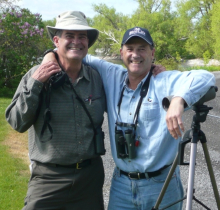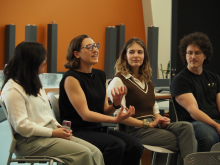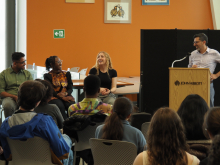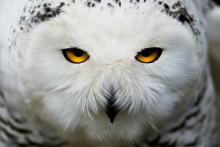Microbes across Earth’s coldest regions are becoming more active as glaciers, permafrost and sea ice thaw, accelerating carbon release and potentially amplifying climate change, according to a new international review from McGill University.


Dean Salwa Karboune is please to announce the following appointments in the Faculty of Agricultural and Environmental Sciences:
Jessica Head
Director of the Morgan Arboretum and Molson Nature Reserve
Professor Jessica Head has been appointed as Director of the Morgan Arboretum and Molson Nature Reserve for a three-year term starting September 2025. Professor Head is an Associate Professor in the Department of Natural Resource Sciences.

In a recent article exploring the environmental and health impacts of plastic pollution on Indigenous fenceline communities in Canada—residential areas that sit next to facilities that emit pollutants like noise, light, odours, chemicals, and even traffic—Aboriginal Peoples Television Network (APTN) spoke to Kanien’kehá:ka environmental advocate Lynn Jacobs about how plastic waste and industrial pollution have turned Indigenous homelands into “sacrifice zones.” Jacobs, who is pursuing a Ph.D.

 Anaïs Médieu, a McGill University postdoctoral researcher working in Natural Resource Sciences Professor Kyle Elliott's lab, has been awarded a Banting Postdoctoral Fellowship for her project on the interactive effects of climate change and plastic contamination on Arctic seabirds.
Anaïs Médieu, a McGill University postdoctoral researcher working in Natural Resource Sciences Professor Kyle Elliott's lab, has been awarded a Banting Postdoctoral Fellowship for her project on the interactive effects of climate change and plastic contamination on Arctic seabirds.

McGill PhD candidate Alexandra Langwieder works with James Bay Indigenous communities to better understand polar bears

Farmers who exchanged text messages with peers were significantly more likely to adopt sustainable agricultural practices, highlighting the power of peer learning in digital formats, a new study co-authored by McGill University Professor Aurélie Harou found.

A surprising number of hummingbirds are falling ill, and experts say your birdfeeder may be to blame.
Ornithologist and McGill Professor Emeritus David Bird spoke to CBC about how to keep your feathered friends safe.

A new study, led by researchers at Aarhus University in Denmark, suggests that levels of mercury in Arctic wildlife could continue to rise significantly even as countries curb their emissions. The researchers' analysis indicates that ocean currents are distributing large, century-old stores of mercury through marine ecosystems in the Arctic.
Large predators end up ingesting the most mercury through their diet of contaminated prey. This poses a serious problem for communities that hunt marine mammals with high concentrations of mercury, like seals.

The Society of Canadian Ornithologists has selected Professor Emeritus David Bird and retired Associate Professor Rodger Titman, who both taught for many years in McGill University's Department of Natural Resource Sciences, to receive the Jamie Smith Memorial Mentoring Award. This award recognizes exceptional contributions to the training and fostering of Canadian ornithologists.

As mobile phones proliferate across the developing world, digital delivery of agricultural advice is positioned to play a transformative role in increasing agricultural productivity and improving livelihoods for smallholder farmers. Meanwhile, evidence shows that peer-to-peer learning, at least in person, can successfully promote technology adoption.

On May 2, 2025, over 60 people gathered in the John Abbott College Library for the Lister Science Chats, where four Macdonald Campus graduate students presented their research and shared how past events as well as the discoveries, sometimes unintentional, and techniques of previous scientists made their work possible.

On April 11, 2025, over 60 people gathered at the annual John Abbott Sustainability Through Science Symposium to hear how the research of three Macdonald Campus graduate students contributes to a more sustainable future. Honours and science students from John Abbott College, as well as members of McGill University's Macdonald Campus community, were inspired by short talks followed by a panel discussion on the students' university experience and their chosen career paths.
Royal Brinkman Canada has appointed Mohammed Antar (PhD, P.Ag) as head of its agronomy department, noting in their announcement that he "will play a key role in helping growers enhance crop productivity and quality through innovative, science-based solutions."
Mohammed earned his Ph.D. in Plant Science (Agronomy) from McGill University in 2024. His expertise spans agronomy, microbe-coated fertilizers, nutrient management, sustainable agriculture, and biological products.

On March 27, McGill honoured 141 laureates at the 20th annual Bravo Gala, celebrating researchers who received prestigious provincial, national or international awards in 2024, including eight researchers in the Faculty of Agricultural and Environmental Sciences.
In his opening remarks, McGill President and Vice-Chancellor, Deep Saini, applauded the honourees for their efforts, underlining the importance of McGill’s research contributions.

An orange tinted snowy owl in Michigan has baffled scientists with its orange colouring, CBC News reports. Experts say it could be a genetic mutation, an accident, or human mischief.
Ornithologist and Professor Emeritus at McGill, David Bird, expressed some doubts about the strange colouration being caused by genetics.
